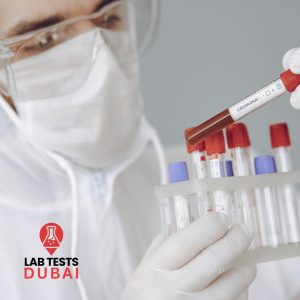
Hepatitis E Virus (HEV) Total Antibody Test – Accurate HEV Detection & Diagnosis
1.050,00 د.إ
The Hepatitis E Virus (HEV) Antibody, Total test detects both IgG and IgM antibodies to HEV, enabling identification of both recent and past infections. It offers comprehensive screening for HEV exposure, making it valuable for diagnosing acute hepatitis E and assessing immunity.
Sample Type : Serum
Methodology : Enzyme-immunoassay
TAT : 10 Days
Description
Hepatitis E Virus (HEV) Antibody, Total – Accurate Detection of Acute & Past Infection
The Hepatitis E Virus (HEV) Antibody, Total Test from Lab Tests Dubai is a specialized blood test that detects total antibodies (IgM and IgG) against the Hepatitis E virus (HEV)—a common cause of acute viral hepatitis in developing countries and increasingly recognized in travelers and immunocompromised individuals.
While often self-limiting, HEV can lead to severe liver disease, especially in:
- Pregnant women (up to 20–30% mortality in third trimester)
- Immunocompromised patients (e.g., transplant recipients)
- Individuals with pre-existing liver disease
This test is essential for:
- Diagnosing acute hepatitis in patients with jaundice or elevated liver enzymes
- Evaluating travelers returning from endemic regions (South Asia, Africa, Middle East)
- Screening pregnant women with liver abnormalities
- Investigating chronic HEV infection in organ transplant patients
- Confirming past exposure in high-risk individuals
Using high-sensitivity enzyme immunoassay (EIA) technology, this serum-based test detects both IgM (acute) and IgG (past) antibodies, helping hepatologists and infectious disease specialists diagnose and manage HEV infection early.
Available with home blood collection, Lab Tests Dubai ensures accurate, private, and stress-free testing—so you can get answers after travel or unexplained liver issues.
Why You Need This Test
If you’ve traveled to India, Pakistan, or Africa and now have yellow eyes, nausea, or dark urine, this test could reveal a potentially dangerous liver infection.
You need the HEV Antibody, Total Test if:
- You have jaundice, fatigue, or abdominal pain after travel
- You’ve consumed contaminated water or undercooked pork, deer, or shellfish
- You’re pregnant and show signs of liver dysfunction
- You’re immunosuppressed (transplant, HIV, chemotherapy)
- You have elevated liver enzymes (ALT/AST) without clear cause
- You live in or visited areas with poor sanitation or HEV outbreaks
This test helps:
- Confirm HEV infection when other hepatitis viruses are ruled out
- Guide supportive care or antiviral treatment (e.g., ribavirin in chronic cases)
- Protect pregnant women and unborn babies
- Prevent transmission in high-risk settings
Early detection = faster recovery and prevention of liver failure.
Symptoms That Indicate This Test
Consider the HEV Antibody Test if you experience:
✅ For Acute Hepatitis E:
- Jaundice (yellow skin/eyes)
- Dark urine, pale stools
- Fatigue, nausea, vomiting
- Abdominal pain (upper right side)
- Fever, loss of appetite
✅ For High-Risk Individuals:
- Recent travel to HEV-endemic regions (India, Nepal, Egypt, Sudan)
- Consumption of undercooked meat or game
- Exposure to contaminated water or sewage
✅ For Vulnerable Populations:
- Pregnant women (especially 2nd/3rd trimester)
- Organ transplant recipients
- Patients with chronic liver disease
These signs may point to Hepatitis E—and this test helps start life-saving treatment.
Natural Production: How Antibodies Reveal HEV Infection
Hepatitis E spreads primarily through:
- Fecal-oral route (contaminated water, poor hygiene)
- Undercooked meat (pork, wild boar, deer)
- Blood transfusion or organ transplant (rare)
After infection:
- IgM antibodies appear 4–6 weeks after exposure → acute infection
- IgG antibodies rise later and persist for years → past exposure
- The “Total” antibody test detects both, indicating recent or past infection
Key Facts:
- Most cases are self-limiting (resolve in 2–6 weeks)
- Pregnant women are at risk of fulminant hepatitis
- Immunocompromised patients may develop chronic HEV (not self-limiting)
- Genotype 3 (in developed countries) linked to zoonotic transmission
This test is best interpreted with liver function tests (LFTs) and HEV RNA PCR if chronic infection is suspected.
What Happens If Untreated? Risks of Ignoring Hepatitis E
Ignoring HEV infection can lead to:
⚠️ Acute Liver Failure – especially in pregnant women
⚠️ Chronic Hepatitis – in transplant or HIV patients
⚠️ Liver Cirrhosis or Fibrosis – from persistent infection
⚠️ Fulminant Hepatic Failure – life-threatening
⚠️ Vertical Transmission – to newborn (rare)
The good news? Most cases resolve on their own, but:
- Pregnant women need close monitoring
- Chronic HEV can be treated with ribavirin
- Supportive care (hydration, rest) is crucial
Early testing = prevention of severe complications.
How to Prepare for the Test
To ensure accurate results:
✅ No fasting required
✅ Continue your regular medications—but inform your doctor
✅ Inform your doctor of:
- Travel history and duration
- Dietary habits (undercooked meat, water sources)
- Pregnancy status or immunosuppression
A serum blood sample is collected via standard draw—available at our labs or via home collection.
Test Overview: Enzyme Immunoassay Method
Interpretation:
- Negative → No evidence of HEV exposure
- Positive → Suggests recent or past infection
- IgM follow-up may be needed to confirm acute infection
Note: For chronic HEV, HEV RNA PCR is recommended.
Benefits of the HEV Antibody Test
🔹 Travel Health Clarity
Get answers after returning from high-risk zones.
🔹 Pregnancy Safety
Protect mother and baby from severe outcomes.
🔹 Liver Protection
Prevent progression in immunocompromised patients.
🔹 Food & Water Risk Assessment
Know if undercooked meat or water made you sick.
🔹 Peace of Mind
Rule out HEV in unexplained liver enzyme elevations.
If you’re worried about jaundice, fatigue, or illness after travel, the Hepatitis E Antibody, Total Test gives you the answers you need in 10 days.



Reviews
There are no reviews yet.